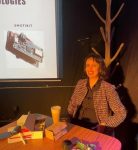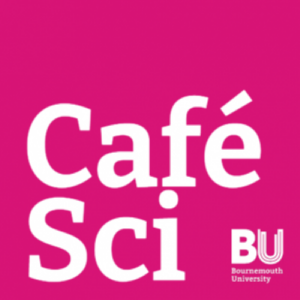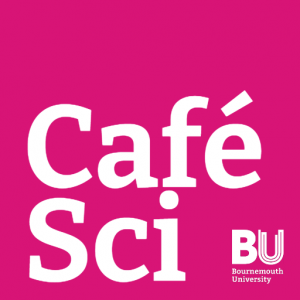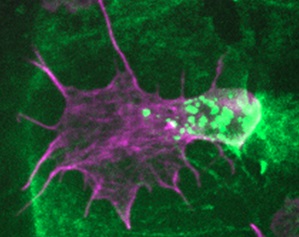

Dr Roya Haratian at Café Scientifique
In April, a full house at Café Scientifique welcomed Dr Roya Haratian, Principal Academic in Electronic Science and Engineering at the Department of Design and Engineering at BU, to share her research with a public audience.
Bournemouth University’s Café Scientifique events take place at The Black Cherry Café in Boscombe on the first Tuesday of the month. Over a cup of coffee or a glass of wine, people can hear about the latest research developments in science and technology.
Dr Haratian explains her research and shares her experience of being involved with Café Scientifique;
Can you give us a brief introduction about your research?
Assistive technology in the home is increasingly part of everyday life. To improve the experience for people who use it, an approach is investigated to adapt machines functionality to the user experience during interaction. As user experience is reflected in physiological signals, body area sensing systems can be utilised to enable the machines to recognise the user experience and provide feedback in real-time. Ethical justifications and concerns in the development of such assistive technologies were the subject of discussion in this Café Scientifique.
Why did you agree to participate in Café Scientifique?
The talk for Café Scientifique was designed to share some part of my research with public to introduce the topic and have their opinion and thoughts on it as potential stakeholders of future products and services.
Can you tell us more about your talk?

Café Scientifique audience at The Black Cherry
In this session I introduced an approach for real-time user experience recognition for assistive technologies. The reflection of user experience in physiological signals was investigated through different psychological models along with how to collect the signals and mathematically model the mapping of physiological signal changes. Using machine learning and artificial intelligent techniques, I could show how such signals have the potential to be mapped into the basis of the user’s psychological space model; therefore, predicting the user experience and enabling adaptation of the machine functionality based on the prediction during the interaction.
The ethical justification of the development of such assistive technologies discussed which includes minimising the need for assistance and enhancing the wellbeing or quality of life of people needing care. However, there are ethical concerns including a reductionist view of emotions which could potentially ignore the widely recognised psychological, cultural, and social dimensions of emotions. Solutionism is another concern and addresses whether technical fixes can be applied to genuinely social or political problems. Furthermore, the privacy and autonomy of users and their experiences is another concern. The tendency of machine learning techniques to normalise and generalise human behaviour and emotional reactions was the last ethical concern discussed and I presented potential solutions.

Dr Roya Haratian speaking at Café Scientifique
How do you feel your event went?
I am always passionate to talk about my research and found it quite interesting that the venue was fully booked. It demonstrated the public’s interest in the topic and during the presentation I could feel that interest in the audience’s questions. I am glad that BU provided me with this opportunity to share my research with the public and have their thoughts taken onboard for the next stages of my research development.

Dr Roya Haratian speaking at Café Scientifique
What did you get from your event?
The ethical justifications and concerns opened a series of questions and discussions which helped me to better understand the view of potential stakeholders while discussing potential solutions for the raised concerns. For further development of research, it is very important to be engaged with potential users and Café Scientifique provided me with this opportunity to hear from them to consider their viewpoints. At the end I shared a survey about the research to better collect their opinion and thoughts.
If you are interested, please feel free to take part in this survey which would be open till mid May 2024.
 If you would like to find out more about our Café Scientifique series, or if you’re interested in getting involved in sharing your research with the public at future events, please read our blog post and register your interest.
If you would like to find out more about our Café Scientifique series, or if you’re interested in getting involved in sharing your research with the public at future events, please read our blog post and register your interest.

 Café Scientifique is a public event that takes place at
Café Scientifique is a public event that takes place at 
 There are many dangers faced by societies, communities, and households today – whether that is accidents in the home, flooding, other extreme weather events, medical emergencies such as pandemics, and even terrorism.
There are many dangers faced by societies, communities, and households today – whether that is accidents in the home, flooding, other extreme weather events, medical emergencies such as pandemics, and even terrorism.
 We’ll be joined by four postgraduate researchers from Bournemouth University on Tuesday 7 May 6:30 – 8:00pm.
We’ll be joined by four postgraduate researchers from Bournemouth University on Tuesday 7 May 6:30 – 8:00pm. We are looking for 3-4 post-graduate researchers to take part in a special edition of our Café Scientifique public event series to
We are looking for 3-4 post-graduate researchers to take part in a special edition of our Café Scientifique public event series to We’ll be joined by Peter Phillips
We’ll be joined by Peter Phillips 
 We’ll be joined by Pamela Armstrong
We’ll be joined by Pamela Armstrong  We’ll be joined by
We’ll be joined by  Many of us know that white blood cells help fight bacteria, but we may not be aware that they also act as tiny ‘couriers’, moving all around the body to deliver its building blocks. Without these couriers, the body cannot be constructed properly.
Many of us know that white blood cells help fight bacteria, but we may not be aware that they also act as tiny ‘couriers’, moving all around the body to deliver its building blocks. Without these couriers, the body cannot be constructed properly. Barriers such as dams and weirs alter a river’s natural flow, severely affecting aquatic ecosystems and leading to a decrease in water quality. Researchers in Europe have been working to address this issue – with the goal of reconnecting 25,000km of rivers by 2030.
Barriers such as dams and weirs alter a river’s natural flow, severely affecting aquatic ecosystems and leading to a decrease in water quality. Researchers in Europe have been working to address this issue – with the goal of reconnecting 25,000km of rivers by 2030. How can we shape a better future for ourselves and the planet? Join us on Tuesday 5 September 6:30-8pm for an evening of inspiring talks and discussions with postgraduate researchers from Bournemouth University, all currently working towards their PhDs, who will share their insights and perspectives.
How can we shape a better future for ourselves and the planet? Join us on Tuesday 5 September 6:30-8pm for an evening of inspiring talks and discussions with postgraduate researchers from Bournemouth University, all currently working towards their PhDs, who will share their insights and perspectives.










 Expand Your Impact: Collaboration and Networking Workshops for Researchers
Expand Your Impact: Collaboration and Networking Workshops for Researchers Visiting Prof. Sujan Marahatta presenting at BU
Visiting Prof. Sujan Marahatta presenting at BU 3C Event: Research Culture, Community & Can you Guess Who? Thursday 26 March 1-2pm
3C Event: Research Culture, Community & Can you Guess Who? Thursday 26 March 1-2pm UKCGE Recognised Research Supervision Programme: Deadline Approaching
UKCGE Recognised Research Supervision Programme: Deadline Approaching ECR Funding Open Call: Research Culture & Community Grant – Apply now
ECR Funding Open Call: Research Culture & Community Grant – Apply now ECR Funding Open Call: Research Culture & Community Grant – Application Deadline Friday 12 December
ECR Funding Open Call: Research Culture & Community Grant – Application Deadline Friday 12 December MSCA Postdoctoral Fellowships 2025 Call
MSCA Postdoctoral Fellowships 2025 Call ERC Advanced Grant 2025 Webinar
ERC Advanced Grant 2025 Webinar Update on UKRO services
Update on UKRO services European research project exploring use of ‘virtual twins’ to better manage metabolic associated fatty liver disease
European research project exploring use of ‘virtual twins’ to better manage metabolic associated fatty liver disease